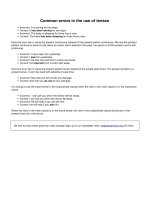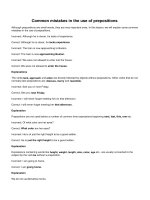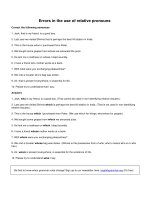Mistakes in the use of copular verbs
Bạn đang xem bản rút gọn của tài liệu. Xem và tải ngay bản đầy đủ của tài liệu tại đây (12.7 KB, 1 trang )
Mistakes in the use of copular verbs
Copular verbs
are special kind of verbs used to join an adjective or noun complement to a subject. Examples
are:
seem, appear, look, sound, smell, taste, feel, become
and
get
.
The problem with these verbs is that sometimes they are also used with other meanings as ordinary non-copular
verbs. When they are used as
copular verbs
, they refer to states and are followed by adjectives or noun
complements. When they are used as ordinary verbs, they refer to actions and are followed by adverbs.
Note that copular verbs are immediately followed by an adjective or noun complement that describes the subject.
Ordinary verbs, on the other hand, are followed by a direct object or a prepositional phrase.
Incorrect: Most people felt angrily about the new tax laws.
Correct: Most people
felt angry
about the new tax laws.
Incorrect: I was beginning to feel coldly.
Correct: I was beginning to
feel cold.
Incorrect: Do you feel happily?
Correct: Do you
feel happy?
When
feel
means ‘experience the condition of one’s body or mind’, it is followed by an adjective, not an adverb.
When
feel
is used as an ordinary verb it means ‘touch’. In this case, it is followed by a direct object. The ordinary
verb feel cannot be modified by an adjective.
He
felt
her
cheeks gently
. (= He touched her cheeks gently.) (NOT He felt her cheeks gentle.)
Incorrect: He
looks smartly
.
Correct: He
looks smart.
Incorrect: She
looked tiredly
.
Correct: She
looked tired.
In the example given above,
look
is a copular verb and hence it should be followed by an adjective.
Incorrect: He
looked
at me
angry.
Correct: He
looked
at me
angrily.
In the example given above, look is an ordinary verb and hence it should be modified by an adverb.
Be first to know when grammar rules change! Sign up to our newsletter here: englishgrammar.org (It's free)
Powered by TCPDF (www.tcpdf.org)









